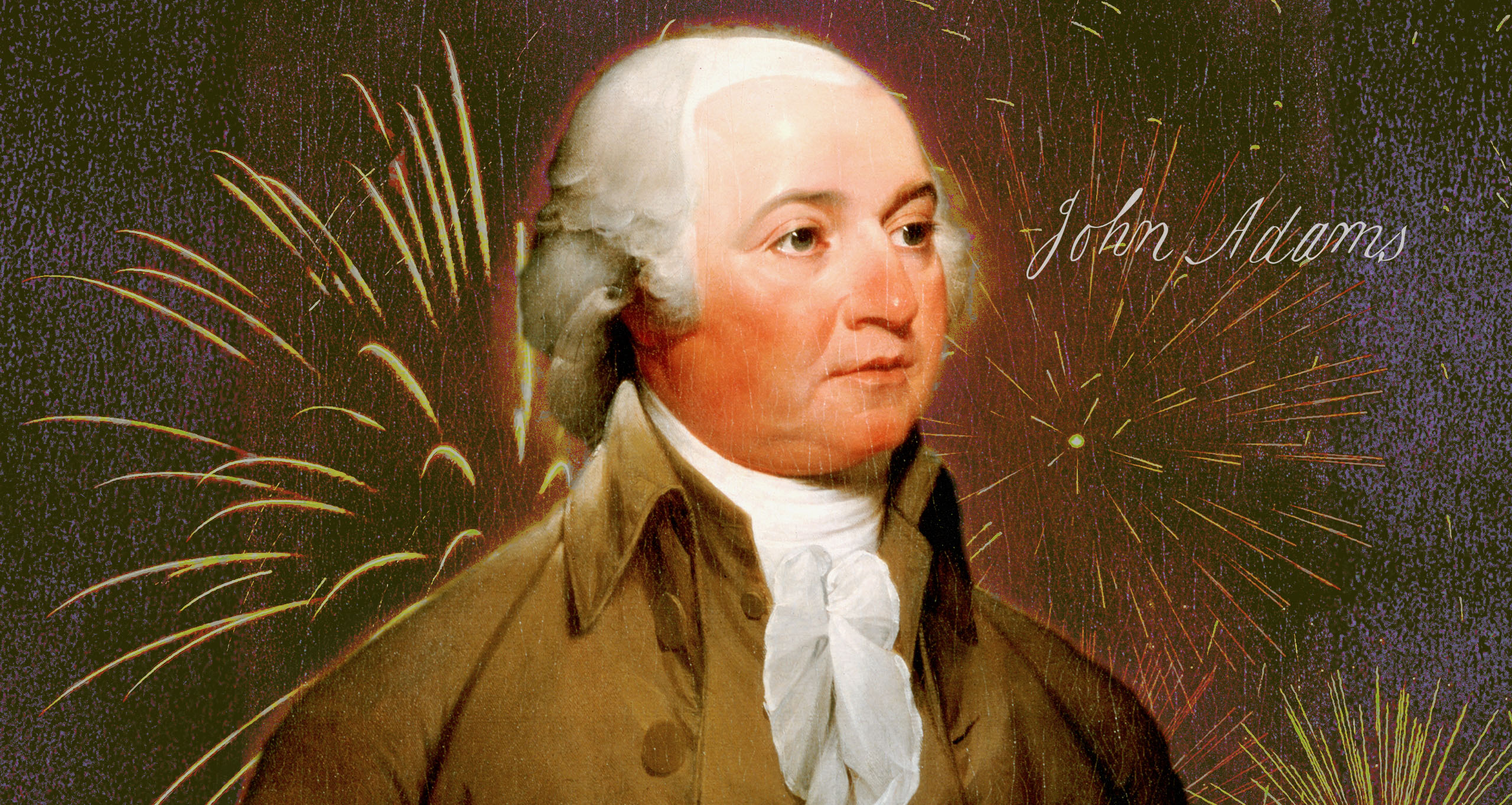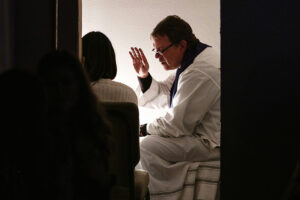Prayers before fireworks: Rediscovering Independence Day with John Adams
Published on June 26, 2025

What if our most American holiday isn’t just about hot dogs and sparklers, but about devotion, gratitude, and freedom’s price? John Adams thought so. Here’s how his vision can reshape our Independence Day.
It turns out the man who helped draft the Declaration of Independence also had some serious and clear ideas about how to celebrate it.
Before the red, white, and blue swimsuits, before the Pinterest-worthy pie crusts, before the $12 sparklers from your uncle’s trunk, there was John Adams. And long before July 4th became synonymous with lake days and American flag sunglasses, he imagined something far more sacred—and still very fun.
In a letter to his beloved wife Abigail, dated July 3, 1776, Adams wrote that Independence Day (which he thought would be July 2nd, more on that in a moment) “ought to be commemorated, as the Day of Deliverance, by solemn Acts of Devotion to God Almighty.” But he didn’t stop there. He went full Founding Father on the party planning, too:
“It ought to be solemnized with Pomp and Parade, with Shews [shows], Games, Sports, Guns, Bells, Bonfires and Illuminations from one End of this Continent to the other from this Time forward forever more.”
In other words: John Adams invented the Fourth of July vibe.
Wait—Why did he think it was July 2nd?
Because technically, it was. Congress voted to approve independence from Britain on July 2, 1776. Adams thought that was the date Americans would remember for centuries.
The official adoption of the Declaration of Independence, however, wasn’t finalized until July 4th. So why the delay? According to the National Archives, Thomas Jefferson, the main writer, had submitted a draft for John Adams and Benjamin Franklin to review. This led to two days of debate over the changes, and by July 4th, the Founding Fathers were ready to sign.
Two days after the independence vote had passed. Anyone who has to push corporate emails through the approval process understands 100%. Nonetheless, July 4th became the date etched into history—and onto every themed paper plate in Target and t-shirt in Old Navy.
Still, Adams didn’t miss the bigger point: a new nation was being born, and its birth deserved celebration not out of ego, but out of gratitude.
Fireworks with a purpose
When Adams said “illuminations,” he didn’t mean gentle candlelight. He meant fireworks. Explosions of color lighting up the sky in honor of hard-won liberty. Fireworks are loud, dramatic, and frankly a little unsafe — kind of like the American Revolution.
The use of fireworks dates back to ancient China, where they were invented in the 7th century, originally for religious festivals and to ward off evil spirits. By the 1600s, they had made their way to Europe and became associated with royal celebrations and military victories.
Colonists in the New World inherited this tradition, using fireworks to mark coronations, peace treaties, and the king’s birthday. So when the Revolution came, it made poetic sense to reclaim the fiery sky — not for a monarch, but for freedom. In fact, the first organized Independence Day fireworks were set off in Philadelphia on July 4, 1777, one year after the Declaration was signed, lighting up a war-torn nation with hope.
Today, we tend to celebrate with glittery sparklers and firework displays synced to country music, which is fun. But the spirit Adams had in mind was a mixture of joy and awe. Not a party to forget your duties to your country, but a party to remember how rare and beautiful it is.
You weren’t just supposed to grill a burger and call it a day. You were supposed to feel the weight of the moment and fill yourself with gratitude for the occasion, then light a bonfire anyway and savor every bite of your s’more.
Devotion, not just dessert
Adams also mentioned something often forgotten in modern barbecues: “solemn Acts of Devotion to God Almighty.” Independence, in his view, wasn’t just a political event. It was spiritual. It was a victory that required humility, reflection, and thanksgiving. This is a common theme associated with winning a war since every leader knows that even when you do everything right, victory is not guaranteed and it’s worthwhile to recognize God’s hand in it.
I was recently reminded of this when I heard the recording of General McRaven (yes, the one with the famous Make Your Bed speech) announcing Osama Bin Laden’s death. He said, “For God and country, Geronimo! Geronimo, Geronimo!” Meaning that Bin Laden had been killed. Proving that in many ways, Adams’ devotion still runs in the veins of many brave Americans.
This isn’t the fireworks-only kind of patriotism. It’s the kind that reminds you freedom didn’t appear out of thin air — it was bought with prayer, courage, and risk. So yes, thank a veteran. But also thank God.
In a culture obsessed with self-expression, the Fourth is actually about collective gratitude. It’s about stopping, recognizing what’s been given, and maybe whispering a prayer before you eat that red velvet cupcake with the flag toothpick in it.
Why this all matters (even in 2025)
Adams’ vision remains surprisingly modern. He didn’t want Americans to celebrate with empty gestures or passive indifference. He wanted us to feel it. To celebrate with our whole bodies. Our whole hearts. And maybe even a marching band.
It’s easy to become cynical in a world where national pride feels like a political statement. But patriotism doesn’t have to mean a policy. It means acknowledging that what we have is worth preserving. Worth celebrating. Worth fighting for.
When Adams dreamed of “pomp and parade,” he wasn’t glorifying war. He was glorifying what came after it: peace, possibility, and people who could now choose their destiny.
So this July 4th, go ahead — make the pie, wear the stripes, light the bonfire. But maybe also read the Declaration out loud. Say a prayer for the country. Thank the Founders for doing the hardest thing — so we could have the freedom America will forever be known for.
Just as John Adams wanted it.




Happy Independence Day– I like to use the real title to not let the reason for “The 4th of July” be forgotten–
the music, fireworks always brings me to tears.
Our country is a miracle.
God rest our Founding Fathers (and Mothers), all our veterans and fallen in action. May we be worthy of their sacrifices for countless generations more.
It’s said Washington had spirits protecting him. In battle. Praying is appropriate. And many of the things we do on the 4th are appropriate as well. It is a day of celebration and joy. We also have other holidays veterans day, memorial day. These celebrations are about the heavy lifting of our independence. It’s better than being forgotten all together!! The British would have hung Adam’s, if it wasn’t for Washington. His birthday 🎂 should be above all of it. The hole story of American Independence is amazing. And good reason to believe in God. Children of all ages 5 to 95 enjoy fireworks. Don’t over think it. Shouldn’t expect too much from other people. Some people would say we are deplorable. What do they know?
Love a parade as a young girl in our little Riverton home town. This year due t o my age will be staying out of the heat but my heart will be there and will pray for our hard fought freedom. Did spend three days at Gettysburg this June. The sacrifice for freedom is front and center on the beautiful fields of Gettysburg PA.
I wish I knew how to forward this article? Sooo good!
Click on the gray bar that says refinelife.co at the top of the page. A menu including “copy link” will appear.
Or just click on the forward icon on the right side of the gray bar!
Every Catholic church has a worship service on the 4th of July! We call it Mass. In fact we have it every day, but the holidays are special. There’s nothing better than prayer.
Happy Independence Day! Pray for our nation, our military, our leaders, and that we all draw nearer to GOD!
Very well written expression of gratitude to God, duty to country, and commitment of self to the general good. Happy 4th!
Related to him!